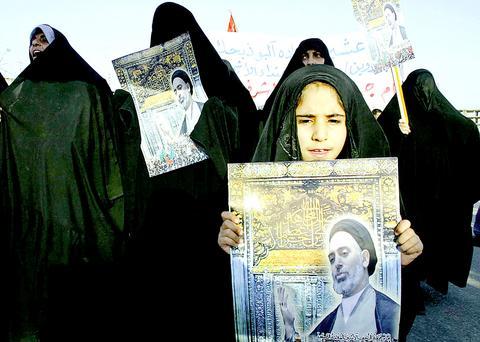Institutional failures at The New York Times led to it being used in a "cunning campaign" by those who wanted the world to believe Iraq had weapons of mass destruction, the paper's ombudsman said yesterday.
Daniel Okrent, who has the title "public editor," wrote in a scathing review of the paper's coverage of the weapons issue ahead of the Iraq invasion last year that The Times had been guilty of flawed journalism.
"Some of The Times's coverage in the months leading up to the invasion of Iraq was credulous; much of it was inappropriately italicized by lavish front-page display and heavy-breathing headlines," Okrent said.

PHOTO: AFP
The newspaper's editors on Wednesday acknowledged they had failed to challenge adequately information from Iraqi exiles who were determined to show former Iraqi leader Saddam Hussein had weapons of mass destruction and overthrow him.
The editors said they "should have been challenging reporters and pressing for more skepticism." Among other things, they said the paper had relied on "misinformation" from Iraqi exile Ahmad Chalabi, once considered Washington's top Iraq ally.
No chemical, biological or nuclear weapons were found in Iraq after the invasion.
Okrent wrote that a series of articles on the search for weapons of mass destruction by a Times reporter who was embedded with US troops in Iraq "constituted an ongoing minuet of startling assertion followed by understated contradiction."
But he said it would be unfair to pin the blame on specific reporters.
"The failure was not individual, but institutional," he said.
Okrent blamed "the hunger for scoops," saying Times readers "encountered some rather breathless stories built on unsubstantiated `revelations' that, in many instances, were the anonymity-cloaked assertions of people with vested interests."
He said some stories pushed the Pentagon line so aggressively "you could almost sense epaulets sprouting on the shoulders of editors."
Okrent, who was appointed in December as part of efforts to restore the paper's image following the Jayson Blair scandal, said editors needed to launch a series of "aggressively reported stories detailing the misinformation, disinformation and suspect analysis that led virtually the entire world to believe [Saddam] had WMD at his disposal."
"The aggressive journalism that I long for, and that the paper owes both its readers and its own self-respect, would reveal not just the tactics of those who promoted the WMD stories, but how The Times itself was used to further their cunning campaign."
The editor of the Times at the time of the Iraq invasion was Howell Raines, who resigned amid recriminations over the discovery that Blair had invented some stories and plagiarized others over a lengthy period.

Kehinde Sanni spends his days smoothing out dents and repainting scratched bumpers in a modest autobody shop in Lagos. He has never left Nigeria, yet he speaks glowingly of Burkina Faso military leader Ibrahim Traore. “Nigeria needs someone like Ibrahim Traore of Burkina Faso. He is doing well for his country,” Sanni said. His admiration is shaped by a steady stream of viral videos, memes and social media posts — many misleading or outright false — portraying Traore as a fearless reformer who defied Western powers and reclaimed his country’s dignity. The Burkinabe strongman swept into power following a coup in September 2022

‘FRAGMENTING’: British politics have for a long time been dominated by the Labor Party and the Tories, but polls suggest that Reform now poses a significant challenge Hard-right upstarts Reform UK snatched a parliamentary seat from British Prime Minister Keir Starmer’s Labor Party yesterday in local elections that dealt a blow to the UK’s two establishment parties. Reform, led by anti-immigrant firebrand Nigel Farage, won the by-election in Runcorn and Helsby in northwest England by just six votes, as it picked up gains in other localities, including one mayoralty. The group’s strong showing continues momentum it built up at last year’s general election and appears to confirm a trend that the UK is entering an era of multi-party politics. “For the movement, for the party it’s a very, very big

ENTERTAINMENT: Rio officials have a history of organizing massive concerts on Copacabana Beach, with Madonna’s show drawing about 1.6 million fans last year Lady Gaga on Saturday night gave a free concert in front of 2 million fans who poured onto Copacabana Beach in Rio de Janeiro for the biggest show of her career. “Tonight, we’re making history... Thank you for making history with me,” Lady Gaga told a screaming crowd. The Mother Monster, as she is known, started the show at about 10:10pm local time with her 2011 song Bloody Mary. Cries of joy rose from the tightly packed fans who sang and danced shoulder-to-shoulder on the vast stretch of sand. Concert organizers said 2.1 million people attended the show. Lady Gaga

SUPPORT: The Australian prime minister promised to back Kyiv against Russia’s invasion, saying: ‘That’s my government’s position. It was yesterday. It still is’ Left-leaning Australian Prime Minister Anthony Albanese yesterday basked in his landslide election win, promising a “disciplined, orderly” government to confront cost-of-living pain and tariff turmoil. People clapped as the 62-year-old and his fiancee, Jodie Haydon, who visited his old inner Sydney haunt, Cafe Italia, surrounded by a crowd of jostling photographers and journalists. Albanese’s Labor Party is on course to win at least 83 seats in the 150-member parliament, partial results showed. Opposition leader Peter Dutton’s conservative Liberal-National coalition had just 38 seats, and other parties 12. Another 17 seats were still in doubt. “We will be a disciplined, orderly